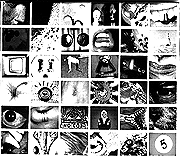








Pearl Jam knows change is not necessarily for better or worse. There is no "Alive" on the new CD. There is no "Rearviewmirror" and there is no "Immortality." Instead there are "Sometimes," "In My Tree," "Red Mosquito," "Present Tense" and nine other songs, varying in energy and motion yet united as five against one, a.k.a. Pearl Jam, releases its latest, No Code.
The codeless band returns in full force with fresh insight on change, growing up and success after working on individual side projects. Guitarist Mike McCready enjoyed a brilliant album with Alice in Chains' Layne Staley and other musicians in their band Mad Season. Jeff Ament plays bass for Three Fish in his spare time. Eddie Vedder returns after intense vocals for Tim Robbins' Dead Man Walking. Former Red Hot Chili Peppers drummer Jack Irons joins the band on this album. Stone Gossard pitches in exquisitely on guitar.
 The title reflects the new Pearl Jam tracks' free-flowing variety of commentary on youth and serves as a coming-of-age album. The Seattle band has survived into the post-grunge neo-maxi-zoom-dweebie era and lives to make music about it. Pearl Jam shares its knowledge of the multifaceted, surreal, dynamic nature of life.
The title reflects the new Pearl Jam tracks' free-flowing variety of commentary on youth and serves as a coming-of-age album. The Seattle band has survived into the post-grunge neo-maxi-zoom-dweebie era and lives to make music about it. Pearl Jam shares its knowledge of the multifaceted, surreal, dynamic nature of life.
In "Sometimes" Vedder mildly shies away from his rich "Garden" voice of the long-gone Ten days. The repetitive lines and soft strumming speak to one side of the indecisive, noncomittal tone of the album. After this opener, he flies into "Hail, Hail," a love song under a fast, guitar-heavy disguise that closes with "Hail, hail the lucky ones, I refer to those in love." The crank in volume alone demonstrates another of the diverse sounds.
The mere smattering of potent lyrics directs attention to each song's overall tone. The dynamic sense of the album reflects its title. The range in the songs' atmospheres covers a Hawaiian lounge act, harmonica à la Neil Young, a quasi-country tune and even an all-too-catchy yet "alternative" piece, in the disturbingly accurate parody "Mankind."
Brendan O'Brien's recurring piano reminds everyone of Pearl Jam's refusal to be pigeonholed and trapped into some painful formula album after album, with which so many of today's acts so willfully comply.
No Code's eco-friendly packaging provides a delight and a hobby, with its multitude of surreal images including eyes, cryptic sights and mouths of chipped teeth, plus nine Polaroid-style trading cards with lyrics. Among doodled hearts and spirals, a few words from "Smile" appear on the back of a picture of larger-than-life lips. "Go Stop Ill Well Sell Buy Soon Never Hate Love Good Bad Yes No" and letters in Ouija-board font are printed on the CD itself.
Throughout the album, parcel and package emphasize a rejection of homogeneity and the radio-friendly ditty that sticks to the mouth. "It's all just imitation. . . . It's all across this nation," Vedder sings in "Mankind," amid repetitive, glam-rock riffs.
A distinctly different song, "Lukin," recalls the screamed vocals on Versus and instills the fear in listeners that Vedder is using his last breaths for this 62-second piece.
As far as identifying itself, Pearl Jam gives no single answer. In the gleeful, singalong-style "Who You Are," Vedder wishfully sings, "transcendental consequence, yes to transcend where we are, who are we, who we are."
Over fluid guitars, "I'm Open" starts with a tale of a man who "is alive but feels absolutely nothing, so is he?" Here and other times, Pearl Jam addresses the difficulties of growing up, the confusion, the despair, once muttering, "So this is what it's like to be an adult." Loss of innocence, evanescence and frivolity that accompany youth and maturation inhabit all 13 tracks that clock in at just under 50 minutes.
Wistfully, before chanting "I'm open," Vedder says, "If he only knew now what he knew then," remarking on this lost innocence that the band recognizes as so crucial. The album as a whole emphasizes the transitory side of life, ever changing and utterly varied.
As the CD and songs illustrate, the band is idling between past and future, never and always, youth and death, ephemeral and eternal. This indeterminate feeling defines this fourth ambivalent album.
The angst level is down from Vitalogy; life-affirming, sentimental songs replace the paranoia and violence of past work. The masterful instrumentals, however, continue as always. Irons puts out stunning drumwork in "In My Tree" and Ament powerfully strums his bass in "Smile," during which Vedder liltingly, sweetly sings, "I miss you already, I miss you always."
The album closes with the soothing, lounge-style avowal "Around the Bend," which ends with a promising "sun coming around the bend."

Copyright © 1996, The Oberlin Review.
Volume 125, Number 1; September 6, 1996
Contact Review webmaster with suggestions or comments at ocreview@www.oberlin.edu.
Contact Review editorial staff at oreview@oberlin.edu.